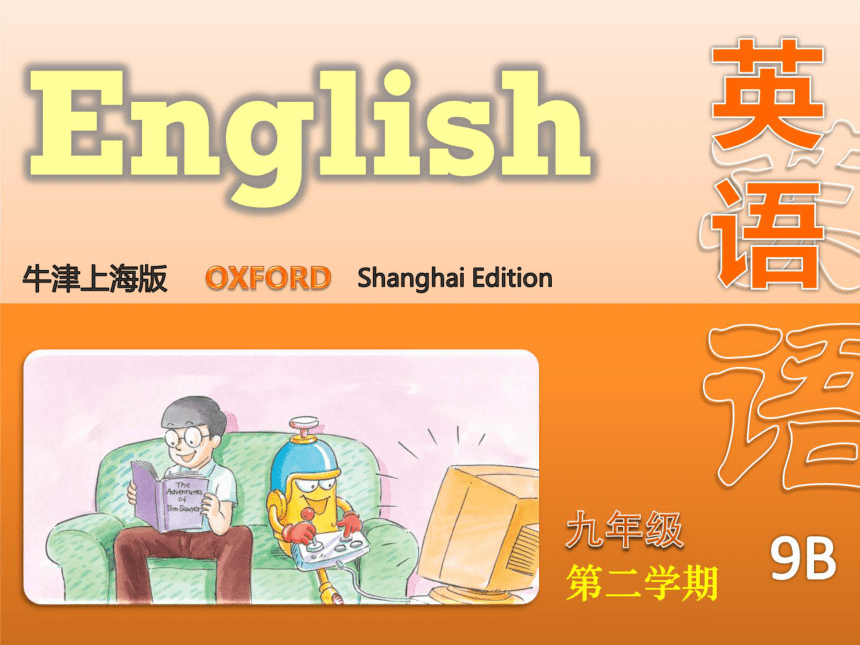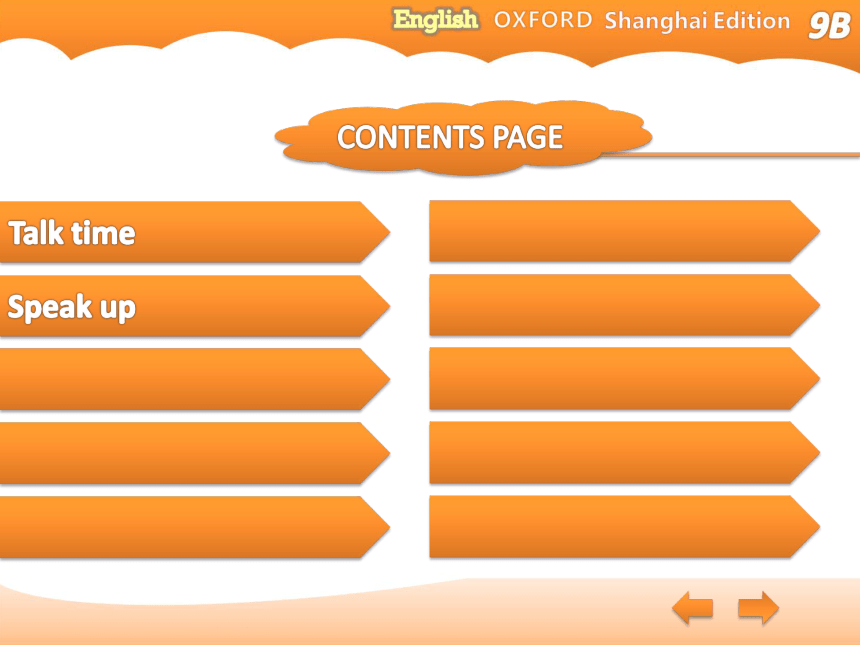牛津上海版英语九年级下册课件:Module1 Unit 1 Saving the Earth Speaking(共12张PPT)
文档属性
| 名称 | 牛津上海版英语九年级下册课件:Module1 Unit 1 Saving the Earth Speaking(共12张PPT) |

|
|
| 格式 | zip | ||
| 文件大小 | 7.0MB | ||
| 资源类型 | 教案 | ||
| 版本资源 | 牛津上海版(试用本) | ||
| 科目 | 英语 | ||
| 更新时间 | 2016-04-06 19:40:59 | ||
图片预览






文档简介
课件12张PPT。1Environment and life1Saving the EarthSpeakingCONTENTS PAGETalk timeSpeak upTalk time5-112Expressing preferences and reasonsWhen we express a preference for something, we say we like it better than something else. Sometimes we give a reason why we prefer it.345Usually, we express preferences with I prefer. But it is considered slightly rude as it is very direct.
The use of modal verb would makes preferences sound more hesitant and polite.— Shall we have some chicken?
— Well, I’d prefer duck.Rather can also be used to express preferences. It should always be used together with would.— Shall we have some chicken?
— Well, I’d rather have duck.5-212345 Arthur is in a restaurant with Pansy. He is ordering some drinks. Read their conversation and answer the questions. Then work in pairs to practise the conversation.A1Let’s have a drink, Pansy. They’ve got cola, milk, tea and coffee. Which would you prefer?I’d prefer a cola. What about you?I’m going to have a hot coffee. I need something to warm me up. Waiter! One cola and one coffee, please.5-3123451 In which sentence does Arthur ask for Pansy’s preference?
2 In which sentence does Pansy respond?
3 In which sentence does Arthur give a reason for his choice?Which would you prefer?I’d prefer a cola.I need something to warm me up.5-412345 Work in pairs to make two conversations similar to the one in A1. The following words may help you.A21 food: rice, noodles, sandwiches, pizzas, hamburgers
2 soup: seafood, potato, tomato, cabbage5-512345Speak upA survey on preferences Work in groups. In each group, one student (S1) is doing a survey to find out what things young people like and dislike.B1S1 must ask the group for their preferences about the following:
1 the things they read (storybooks, comics, newspapers, magazines, etc.)
2 the music they listen to (pop, classical, rock, etc.)
3 the TV programmes they watch (cartoons, dramas, news, etc.)
4 the films they watch (war, action, etc.)Which do you prefer reading, storybooks, comics, newspapers or magazines?2-112 After the survey, S1 must tell the class the results. You can use the sentence patterns in the boxes and the example to help you.*B22-212说 明
本册教材根据上海市中小学(幼儿园)课程改革委员会制订的课程方案和《上海市中小学英语课程标准(征求意见稿)》编写,供九年义务教育九年级第二学期试用。
本教材经上海市中小学教材审查委员会审查准予试用。
《英语(牛津上海版)》(试用本)
主 编:沃振华
原 作 者:P Etherton G McArthur
改编人员:沃振华 朱维庭 李绍贤 施安吉 施志红
奚翠华 卢 璐 张 瑶
牛津大学出版社(中国)有限公司英语教材编写委员会
责任编辑:林 妍 马芳芳
插 图:K Y Chan 周允达 张亚宁
课件制作:卢 璐
支持学校:上海市市北初级中学classical/'kl?s?kl/ adj.widely accepted and used for a long time; traditional in style or idea Do you know the differences between the classical and modern ballets?
The use of modal verb would makes preferences sound more hesitant and polite.— Shall we have some chicken?
— Well, I’d prefer duck.Rather can also be used to express preferences. It should always be used together with would.— Shall we have some chicken?
— Well, I’d rather have duck.5-212345 Arthur is in a restaurant with Pansy. He is ordering some drinks. Read their conversation and answer the questions. Then work in pairs to practise the conversation.A1Let’s have a drink, Pansy. They’ve got cola, milk, tea and coffee. Which would you prefer?I’d prefer a cola. What about you?I’m going to have a hot coffee. I need something to warm me up. Waiter! One cola and one coffee, please.5-3123451 In which sentence does Arthur ask for Pansy’s preference?
2 In which sentence does Pansy respond?
3 In which sentence does Arthur give a reason for his choice?Which would you prefer?I’d prefer a cola.I need something to warm me up.5-412345 Work in pairs to make two conversations similar to the one in A1. The following words may help you.A21 food: rice, noodles, sandwiches, pizzas, hamburgers
2 soup: seafood, potato, tomato, cabbage5-512345Speak upA survey on preferences Work in groups. In each group, one student (S1) is doing a survey to find out what things young people like and dislike.B1S1 must ask the group for their preferences about the following:
1 the things they read (storybooks, comics, newspapers, magazines, etc.)
2 the music they listen to (pop, classical, rock, etc.)
3 the TV programmes they watch (cartoons, dramas, news, etc.)
4 the films they watch (war, action, etc.)Which do you prefer reading, storybooks, comics, newspapers or magazines?2-112 After the survey, S1 must tell the class the results. You can use the sentence patterns in the boxes and the example to help you.*B22-212说 明
本册教材根据上海市中小学(幼儿园)课程改革委员会制订的课程方案和《上海市中小学英语课程标准(征求意见稿)》编写,供九年义务教育九年级第二学期试用。
本教材经上海市中小学教材审查委员会审查准予试用。
《英语(牛津上海版)》(试用本)
主 编:沃振华
原 作 者:P Etherton G McArthur
改编人员:沃振华 朱维庭 李绍贤 施安吉 施志红
奚翠华 卢 璐 张 瑶
牛津大学出版社(中国)有限公司英语教材编写委员会
责任编辑:林 妍 马芳芳
插 图:K Y Chan 周允达 张亚宁
课件制作:卢 璐
支持学校:上海市市北初级中学classical/'kl?s?kl/ adj.widely accepted and used for a long time; traditional in style or idea Do you know the differences between the classical and modern ballets?
